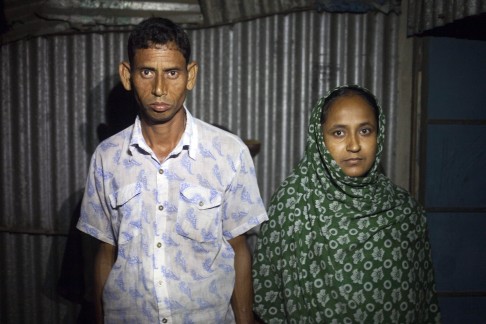Bangladesh's illegal kidney trade booms as donors turn brokers
A chronic shortage of organs for transplant has led to a growing web of donors-turn-brokers who take cuts for successful recruits
PUBLISHED : Wednesday, 14 October, 2015, 11:40pm
UPDATED : Thursday, 15 October, 2015, 1:50am
Agence France-Presse in Kalai

A victim shows the foot-long scar from the kidney removal. Photos: AFP
After years of crippling debt, Bangladeshi villager Rawshan Ara decided to follow in her family's footsteps - and sell a kidney on the black market to raise cash.
Like many of her neighbours in this poor farming area, the 28-year-old easily found a local broker and quickly became a victim of Bangladesh's thriving but illegal organ trade.
The mother-of-one insists her sister and brother-in-law warned her against having the surgery in February, after suffering complications from their own operations two years ago.
"But I was tired of poverty," Ara said in Kalai district, which has become a hotspot for the racket. "My husband is perennially sick. My daughter's education became costly. I went to Dhaka to be a maid or garment worker. But the wages were abysmal," she said, declining to give the name of her broker.

Bangladeshi villager Rawshan Ara, 28 and her husband pose at their home in the village of Kalai. After years of crippling debt, Ara decided to follow in her family's footsteps - and sell a kidney on the black market to raise cash.
Police, however, tell a different story. They suspect the relatives talked her into going ahead with the operation - part of a growing web in Kalai of donors who turn brokers, taking a commission for anyone they successfully recruit.
"This year alone, 40 people from Kalai have sold their kidneys," local police chief Sirajul Islam said, and 200 villagers since 2005. Another 12 villagers are currently missing, suspected to have travelled across to India to hospitals to have the operations.
"Those who have sold kidneys have themselves turned brokers and agents and became part of this huge organ trade network," Islam said. "These agents first target their families and relatives and then villagers."
Bangladeshi villager Belal Hossian, 35, a victim of illegal organ trade, shows the scars from his illegal kidney removal operation in the village of Kalai some 300km northwest of Dhaka.
Some eight million Bangladeshis suffer from kidney disease, mostly because of high rates of diabetes, and at least 2,000 need transplants annually. But donation is only legal between living relatives, resulting in a chronic shortage of kidneys for transplant. A lucrative black market has filled the void, with a steady stream of desperate buyers and equally desperate and poor donors.
After police busted a major scheme in 2011 involving doctors, nurses and clinics, many of the illegal surgeries moved to India.
"This racket has a lot of influential people on their pay rolls," said Mustafizur Rahman, a Bangladesh nephrologist. "They can easily prepare all papers including fake passports and national identity cards in order to facilitate unlawful transplants."
Papers including fake passports and national identity cards can be easily prepared to facilitate unlawful transplants.
Almost every household in Kalai, 300km northwest of the capital Dhaka, has someone with the tell-tale, foot-long scar from the operation. Most suffer health problems because of poor post-surgery care, and can no longer labour on the farms. Some instead become brokers, earning up to US$3,000 for each villager they sign up, Islam said.
"A donor can easily convince a potential seller that he/she has nothing to lose by selling a kidney," said Moniruzzaman Monir of Michigan State University, who has done extensive research in Kalai. "He projects himself as a success story," said Monir, likening the racket in Kalai to a financial "pyramid scheme".
Last month, police arrested a dozen people in Kalai and Dhaka, including a donor turned "kingpin". Authorities were spurred into action after a criminal gang cut out a six-year-old boy's kidney and dumped his body in a pond.
